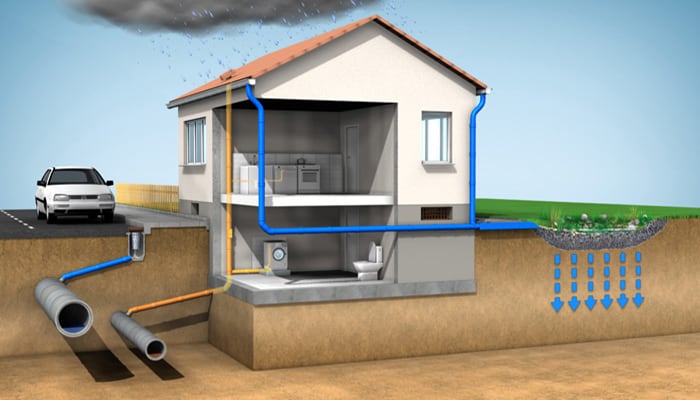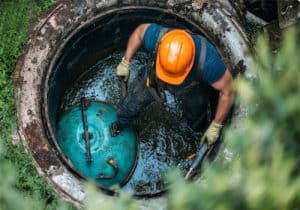
Drainage systems are critical to the safety and efficiency of our current infrastructure’s water runoff control. They are essential in controlling flooding, safeguarding structures from damage, and maintaining ideal environmental moisture levels. However, like any other engineering system, drainage systems require regular maintenance, inspections, and expert help to execute their responsibilities.
Table of Contents
Economic Benefits
Drainage systems are essential in preventing flooding, water stagnation, and infrastructure damage. However, this has significant economic benefits besides providing safety and functionality. In this section, let’s look at some of them.
Preventing damage and loss
Installing an effective system helps prevent damage to infrastructure, such as building foundations, pavement, and other elements caused by flooding and moisture problems. This avoids the need for repairs or replacements, which can save a lot of money.
Reduced maintenance and repair costs
Regular, proactive system maintenance, including cleaning, checking, and drainage survey, can prevent the accumulation of clogs, damage, or water flow obstructions. This reduces the need for repairs and troubleshooting, saving money that could be spent on other markets.
Reduced wastewater disposal costs
A quality system helps manage water runoff efficiently, especially during heavy rainfall or flooding. This avoids problems with overflowing sewage pump stations and the associated wastewater disposal costs. Self-managing water runoff can significantly reduce these costs.
Extended Infrastructure Life
This system helps protect infrastructure from excess moisture, which can harm its stability and durability. Preventing damage and reducing exposure to moisture helps extend the life of buildings, roads, bridges, and other facilities.
Increased property value
Having a well-functioning system can significantly increase property values. Buyers and investors appreciate safety and flood protection when buying or investing in a property. A quality system can be an asset and help achieve higher property values.
Designing and installing an effective system is a vital investment step that will bring not only protection and improved quality of life but also economic benefits on a long-term basis.
Types of Drainage
Surface
Collects and removes water that collects on the ground’s surface. This can be rainwater or water that runs off lawns, yards, or paved areas. Usually uses ditches, gutters, or pipes directing water.
Soil
Removes moisture from the soil and prevents water accumulation that can cause a building’s foundation to collapse or excessive moisture in the basement. Ground uses perforated pipes that sink into the ground and direct water to remote locations.
Rainwater Systems
Rainwater systems are designed to collect and remove rainwater from roofs, pavements, and other building surfaces. They include gutters, drains, pipes, and tanks to collect and divert water from the roof or other locations.
Underground
Underground collects and removes groundwater that can accumulate underground and cause moisture or water logging problems. This type includes using perforated pipe networks, wells, and pumping stations to pump and divert groundwater.
Agro-drainage
Agro-drainage is used in agriculture to improve soil and manage moisture levels. It includes using systems of pipes, channels, and wells that help remove excess moisture from the soil, preventing flooding and increased moisture.
Each type’s characteristics are applied depending on specific conditions and needs. Choosing the correct type and having it installed and maintained based on local conditions and requirements is essential to ensure adequate water removal and prevent possible moisture and flooding problems.
Restore system efficiency with the help of qualified engineers
Professional help is critical when it comes to maintaining systems. Experienced engineers can perform a thorough drainage survey to identify problems such as clogging, collapse, integrity issues, or drain unblocking. They can also offer solutions to improve performance and prevent future problems.
Proactive Maintenance
Proactive system maintenance includes regular inspections and maintenance to prevent potential problems. Highly trained engineers can develop a standard proactive maintenance plan for cleaning, checking, and adjusting. This will help ensure it works efficiently and prevent potential problems.
Drainage Repair
Engineers can provide repair services if you have problems, such as leaks, damage, or blocked drains. They can replace damaged pipes, fix connections, or repair leaks. Drainage repairs are performed using specialized equipment and techniques to restore to regular operation.
Cctv drain survey
Engineers can use CCTV systems to conduct a detailed system survey. This allows them to visually inspect the system’s interior and detect problems, such as clogs, damage, or system integrity disruptions. A CCTV inspection allows you to locate issues and develop appropriate solutions accurately.
Drainage jetting
Drain jetting is when high water pressure or unique solutions remove accumulated deposits and blockage. Engineers can perform jetting to remove clogs and restore normal flow.
Drain unblock
Engineers can provide drain unblocking services if blocked or have obstructing problems. Special tools help remove blockages and restore normal function.
Root Removal
Engineers can perform a root removal procedure if plant roots have penetrated the system, causing blockages or damage. This involves using specialized tools and techniques to remove roots and restore normal system function.
Drainage systems are an integral part of our infrastructure, effectively managing water runoff and preventing potential problems associated with excess moisture. Professional assistance and maintenance are critical to their proper operation and longevity.
Experienced engineers are essential in inspecting, identifying potential problems, and suggesting solutions. Through proactive maintenance and regular inspections, it is possible to prevent problems, minimize risks, and maintain effectiveness over the long term.
Services provided by highly trained engineers include drain repair, CCTV surveys, jetting, unblocking, and root removal. These services ensure the system is restored to regular operation, removing obstructions and preventing possible damage.
The economic benefits are an additional benefit they offer. Efficient water runoff management helps reduce the risk of flooding and damage, leading to lower costs for remediation and repairs. Moreover, maintaining proper systems contributes to preserving property values and improving sustainability.
Understanding the different types of drains, the importance of professional assistance, and available engineering services will help us make the right choices when designing, installing, and maintaining them. Using modern technologies and methods, together with professional expertise, will ensure the efficiency and reliability of drainage, contributing to the safety and comfort of our cities and homes.
Follow – https://sggreek.com for More Updates


